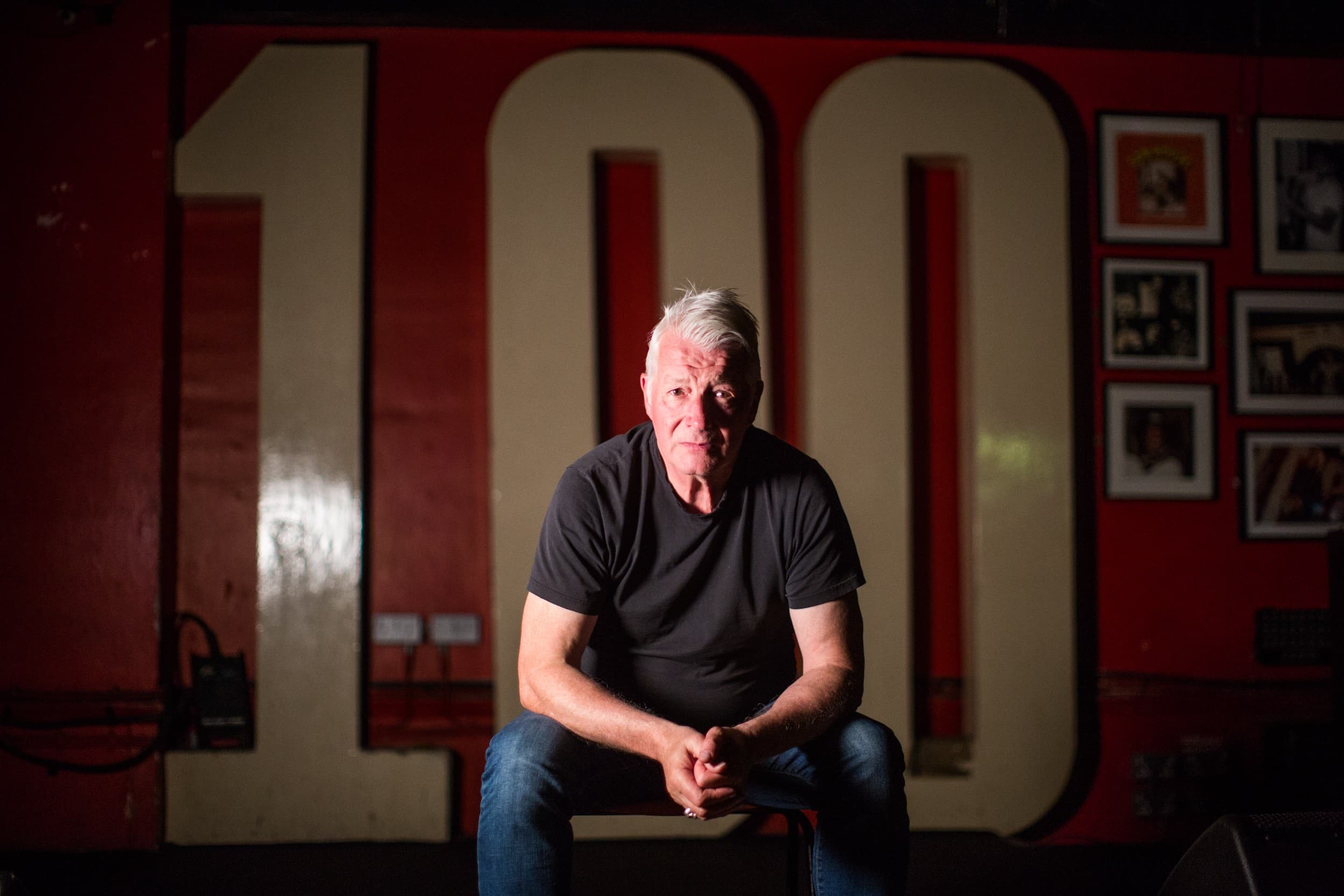
As restrictions ease today, allowing more music venues to resume full service, we spoke to the owner of the 100 Club about navigating through the pandemic, the anticipation for gig-goers to return and the club’s historic legacy.

In recent weeks, many have of us will have experienced a moment of realisation – an event or encounter in which we acknowledge just how long this pandemic has lasted. Meeting with Jeff Horton, owner of the legendary 100 Club on Oxford Street, was one such moment. Having interviewed him just under two years ago – before coronavirus, masks and the two metres separating us were even a thing – we were now speaking again. And there was plenty to discuss.
The pandemic has undoubtedly blighted independent music venues, of which the 100 Club is the oldest in the world. This hasn’t merely been a challenge financially, but for a scene where people are used to energy, noise and rubbing shoulders until 3 a.m. (Jeff is a self-confessed ‘social animal’), these desolate days of stay-at-home lockdowns and sit-down events have proved an enormous struggle.
I still get a kick out of meeting new people and knowing I’m going to see something I’ve never seen before. I’ve missed that really terribly
‘I like interacting and meeting new people,’ says Jeff, perched in one half of his venue; ‘My mindset really hasn’t changed since I first started working here all those years ago. And I still get the same kick out of meeting new people and, more than anything else, knowing I’m going to see something I’ve never seen before around eight or nine o’clock when the first band goes on. I’ve missed that terribly. I’ve missed that really terribly.’
Such a desire to meet people, and genuine, down-to-earth interest in others, are evident in Jeff. And in truth he’s being rather modest. His venue, which would rival any in the world for the roster of talent it’s put on, has led to him meeting a veritable who’s who of the music scene – from Oasis to Nas, Mark E. Smith to AJ Tracey. And whilst photographs of such star-studded names adorn the venue’s walls, Jeff’s name-dropping is never obnoxious or boastful.

With so many bands and acts having cut their teeth on the empty stage in front of us – owing largely to the club’s intimacy, which Bobby Gillespie once praised it for, Jeff candidly remarks – the pandemic has proved just how much people care for the 100 Club. In fact, one of the highlights of the last eighteen months has been ‘the amazingly supportive music community’.
‘Although it’s been very negative for a lot of reasons,’ Jeff says, ‘it’s also been a time where people have reached out and shown they cared and just asked if everything is alright. And that’s really all you need when something like this happens.’
For any venue, closing your doors for the foreseeable future may sound like the worst possible scenario. Yet, remarkably, it’s a situation Jeff is all too familiar with
For any venue, the prospect of closing your doors for the foreseeable future may sound like the worst possible scenario. Yet, remarkably, it’s a situation Jeff is all too familiar with. Facing soaring rent and mounting bills in 2010, the 100 Club, was on the brink of closing down – ‘staring over the precipice’.
‘But I had this bloody-mindedness about me,’ he recalls – spoken like a veteran of navigating his club through hard times – ‘where I thought this place deserves to remain open. I came here for the first time when I was five – it’s been in my family longer than I’ve been around. There was a belligerence in me – a stupid belligerence – that actually this place needs to remain open, because it’s only right and proper that other people who haven’t even been born yet can come here, because this is a place of joy. It’s a place that people have met their life partners, their best friends, they’ve seen things.’

IDLES playing at the 100 Club in February 2019. Photographer: Jamie MacMillan
Within weeks of announcing its closure, a multitude of letters from across the country showed up. One came from a 92-year-old woman which read: ‘I haven’t been to the 100 Club since 1966, but I’ll never forget my time there.’ Inside was a cheque for £500.
As a sign of the club’s significance to all manner of people, Paul McCartney came down to play a solo gig, closing with the line: ‘Mr 100, you have to keep this place going. Because it’s very, very cool.’
… when Paul McCartney gets up and says something like that, you think maybe I have been doing the right thing after all
‘I remember that hit me between the eyes like a sledgehammer,’ Jeff remarks with conviction, ‘because you’re full of self-doubt. And when Paul McCartney gets up and says something like that, you think maybe I have been doing the right thing after all – because he fucking knows.’
To Jeff’s amazement, and relief, the 100 Club was saved from the brink of closure in 2010 by one particular ‘knock on the door’, after which a sponsorship deal was reached with Converse. Illustrating just how personally significant the venue has been in people’s lives, Converse’s Managing Director had his own emotional attachment, having once played the Club as a drummer in the 80s.
ArrayFollowing changes in artistic direction, in 2016 Converse and the 100 Club parted ways, and with the venue revived but still in need of a benefactor, Fred Perry took on the mantle.
Reflecting on the experience now, in light of the pandemic, Jeff says: ‘I think because of what happened in 2010, if anything, I’ve had this overriding belief that everything’s going to be alright.’
I think because of what happened in 2010, I’ve had this overriding belief that everything’s going to be alright
Like many other venues, much of the club’s ability to survive has largely been due to the money awarded through the Cultural Recovery Fund (CRF) – a £1.57 billion initiative first launched in March last year to prevent cultural organisations and heritage sites beset by coronavirus restrictions. This allowed ‘for the first time ever’, Jeff stresses, ‘grassroots music venues to apply for some of that support’.
‘And so what could have been a really stressful time, which it has been for an awful lot of people – restaurants, cinemas and other people in hospitality who have been shut for as long as us – has been okay of us. I haven’t had to make anyone redundant, I could take everybody off furlough and we can pay our landlords and our bills.’

Photographer: Robin Pope

Sleaford Mods playing at the 100 Club in 2016 – the band also live-streamed a gig from the venue in September last year when heavy coronavirus restrictions were in place. Photographer: Robin Pope
Such fortune may appear a world away from the situation faced by many in the music scene. At the beginning of this month, for instance, a group of 22 cross-party MPs signed a Commons motion urging greater support for those in the sector affected by the ‘profound challenges’ of Covid-19.
Specifically, they highlighted that many of the freelancers and self-employed workers – those unable to access funding from the CRF – have been without work for over a year, and that approximately 70% of musicians lost over three-quarters of their work within that time.
Processing this for the first time in all the while we’ve had the pandemic, I feel very lucky. But I feel for other venues
Jeff is well aware of the club’s relative good fortune. Whilst the CRF ‘took away all the troubles people normally have financially’ for the 100 Club, he says, ‘processing this for the first time in all the while we’ve had the pandemic, I feel very, very lucky. But I feel for other venues because it must have been hellish for them.’
Jeff hopes the pandemic will lead to an appreciation for independent music venues in a direct correlation of the challenges they’ve faced: both financially and as social hubs.

‘People have no idea. And I didn’t, until I started getting involved with the Music Venue Trust, how much money live performance generates. It’s staggering – we’re talking billions every year. And it’s the festivals and the O2 gigs, for instance, that generate 95% of that money.
‘But without this little cog in that big wheel of grassroots music venues that find all these bands that end up becoming headliners, that all dies. People didn’t realise – they’re starting to now since the pandemic – without that little cog, the whole fucking wheel stops. It’s as simple as that.’
… without this little cog in that big wheel of grassroots music venues that find all these bands… the whole fucking wheel stops. It’s as simple as that.
‘All these bands, no matter who they are, they all started off in places like this. I remember seeing Muse here,’ he adds as an example. ‘I put them on in 1994 – and I lost 500 quid on fucking Muse.’
‘Without venues like this taking those hits on bands like Muse, we don’t generate that kind of money – not just for themselves, but for the country, for the government, for the venues and everything else. People are starting to realise that is a really important part of that conveyor belt. This is where it all starts. We don’t make the money, but without doing what we do here, that doesn’t happen.’

And as restrictions ease today, the 100 Club is legally allowed to reopen fully. Yet with coronavirus cases on the rise, and personal responsibility being the order of the day, it is doing so with its own common-sense approach. Jeff, who oozes a punkish non-conformity, is still hoping for his staff to ease back into gigs.
‘I’m not going to ask my staff to go from doing nothing to suddenly being run into the fucking ground. That’s not good for anybody. I think we all need a bit of a breaking-in period of six weeks. Because there’s no guarantees there isn’t going to be another shutdown. Touch wood, but nothing’s guaranteed. And I want to give us all the chance to get used to doing our jobs again, slowly.’
I’m not going to ask my staff to go from doing nothing to suddenly being run into the fucking ground. That’s not good for anybody
Whilst proof of vaccination is not required, the Club are encouraging anyone attending their events to take a free lateral flow test and will make masks available for anyone who wishes to wear one. And whilst the stickiness of a sweaty gig is often much loved by the club’s pre-pandemic regulars, staff will still be moving round the venue with cleaning spray throughout.
As a fitting tribute to how much may have changed throughout the pandemic, yet how much has ultimately stayed the same, Jeff has decided to freeze the club’s beer prices. ‘No £8 a pint post-Covid here’ the club proudly announced in their statement.
Cheers, Jeff – we’ll drink to that.




